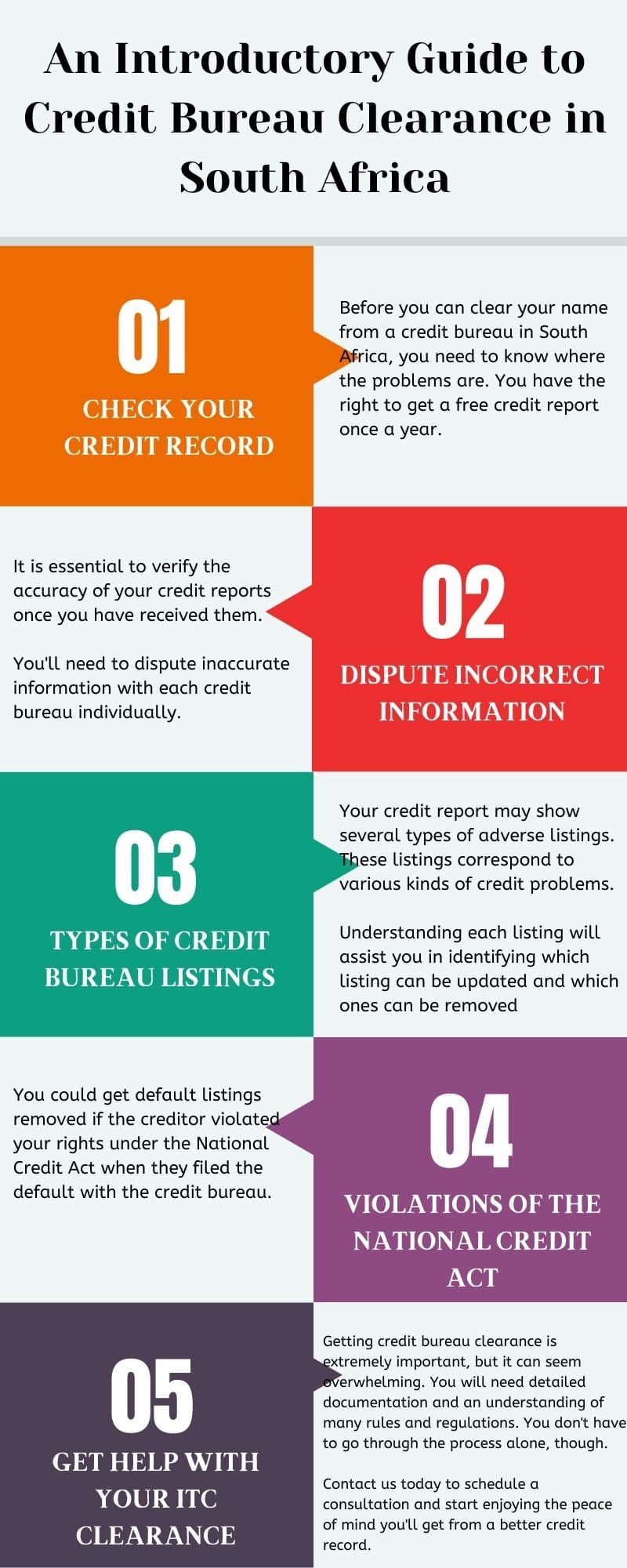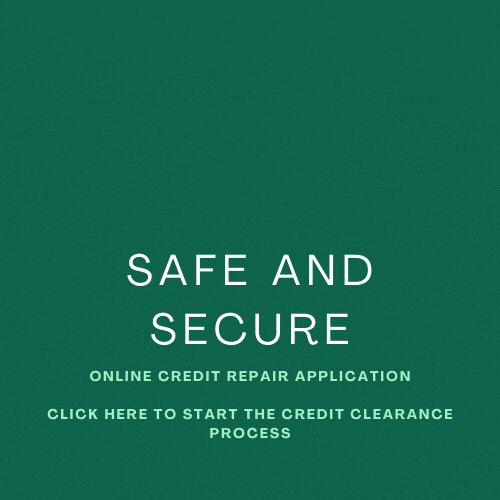Credit Bureau Clearance! An Introductory Guide to ITC Clearance.
The average South African household has debts that total almost 68 per cent of their disposable income. Are you one of the many struggling with debt management? Do you fear being blacklisted from the credit bureaus? Are you looking for credit bureau clearance in South Africa?
Trying to rent a house and applying for a job are just two of the ways your credit report influences your daily life. Credit bureau clearance helps to restore your bureau record. Learn more about how to take control of your bureau profile with credit bureau clearance.
Checking Your Credit Record
Before you can clear your name from a credit bureau in South Africa, you need to know where the problems are. You have the right to get a free bureau report once a year.
Credit Bureaus in South Africa
You'll need to get a report from each bureau. Different bureaus may hold differing information about you.
South Africa has eleven registered bureaus. The four major ones are:
- Experian
- TransUnion
- Compuscan
- Xpert Decision System (XDS)
TransUnion was formerly known as ITC. For many years, it was the only bureau in South Africa. That's why many people refer to credit bureau clearance as ITC clearance.
How To Get Your Credit Report
You have already obtained a copy of your credit report from Compuscan, Experian, XDS, Vericred and TransUnion. By law, you have the right to one free report per year from each bureau under the National Credit act 34 of 2005.
After providing some personal information and answering a few security questions, you'll be able to download your free financial standing report after accessing the credit bureau's website. You can access the credit bureaus online applications below:
It is also possible to request a hard copy of your report to be mailed and emailed for you if you prefer. Your record is private and confidential, and You will need a valid South African ID number to access your report. Additionally, we offer a four-in-one credit report. Get your copy of all your credit bureau reports by contacting us today.
Dispute Incorrect Information on Your Credit Record
It is essential to verify the accuracy of your financial standing reports once you have received them. Because some creditors and banks only report to two or three credit bureaus, your credit reports won't always be the same.
If all five bureaus receive your payment profile history from these creditors, one may inadvertently make a mistake when entering this vital payment behavior history. Therefore, you should examine all five bureaus very closely with a magnifying glass, rather than assuming the information is the same on all five. You can dispute inaccurate information in your reports if you believe it is incorrect.
You'll need to dispute inaccurate information with each bureau individually. Each bureau has its dispute process. You can find out how to file a dispute on the bureau's website or by calling the company. If there are errors or judgments, we offer an easy solution to rectify them. Fill out our simple online application form, and we will start the process as soon as possible. Credit Bureau Clearance
Types Of Credit Bureau Listings
Your credit report may show several types of adverse listings. These listings correspond to various kinds of debt problems. Common types of listings include:
- Default
- Judgments
- Administration orders
- Debt review
- Adverse payment profile histories
- Sequestration and rehabilitation orders
Adverse listings stay on your record for between 1 and 10 years, and it depends on the type of listing.
Default (Adverse) Listings
The two types of default listings are:
- The first is adverse classifications of consumer behavior.
- The second is damaging classifications of enforcement action.
Consumer behavior refers to problems like consistently overdue payments, delinquent payments, or not replying to correspondence from creditors. Enforcement actions include handing debt over to a collection agency, repossession, or repossession of houses and cars.
Adverse listings stay on your record for a year or until you fully pay the debt.

Judgment Listing
A civil court of law may grant a judgment to a creditor or service provider against a consumer who didn't pay their debts. The default judgment is an attempt to force you to pay.
Creditors apply for judgments when consumers have fallen behind on their payments and have neglected to respond to letters of demand in accordance with section 129 of the National Credit Act 34 of 2005. Creditors also go this aggressive route if a consumer has made a payment arrangement, signed an acknowledgement of debt, and has failed to honor this payment arrangement. A judgment can be granted in your absence if you don't take action to defend the summons or make payment arrangements with the creditor.
A judgment stays on your record for five years. It can come off your record sooner if you fully pay the debt or the court rescinds the default judgment.
Administration Order
An administration order is an application you can make yourself. It can help you avoid legal action from creditors.
A magistrate evaluates your financial position and appoints an administrator to whom you must make regular payments. The administrator divides your repayments proportionally among your creditors.
Consumers who use the administration process will reduce their monthly payments. Unlike debt review, creditors only receive debt repayments every three months under debt administration. You can extend the debt repayment terms through this legal process, but it is lengthy and takes longer than debt review.
An administration order stays on your personal profile for five years or until the court rescinds it.
Debt Review
Debt Review is another application you can make yourself. It helps you if you can't afford to pay your creditors and wish to avoid legal action. A Debt Counselor negotiates new payment arrangements with your creditors.
Debt review stays on your report until you receive a clearance certificate. You can get a clearance certificate by:
- Satisfying all your payment obligations under the debt review arrangement order, or
- Demonstrating your financial ability to meet your future obligations
When you have a long-term agreement like a mortgage, you must show you've met your current obligations and have the means to continue to make payments.
Payment profile
Your credit score is heavily influenced by how promptly you pay your monthly accounts. A whopping 35% of your score depends on your payment history! Your reports will list this history through the different accounts you have had in the past five years.
It is possible to see how much you have paid each month under each loan, motor finance account, payday loans, and home loans that you had.
In the case of overdue payments, the account will get marked with the exact period it was late. This indication will range from 30 days to 150 days. The longer you wait between payments, the lower your score becomes.
Sequestration and Rehabilitation Orders
You can apply to the court to issue a sequestration order that declares your insolvent. The court then appoints a trustee to sell your possessions and other assets.
You must pay whatever debt obligations remain after selling your assets. These can be in the form of a payment plan.
Sequestration orders stay on your personal profile record for five years unless the court issues a rehabilitation order.
You can successfully apply for a rehabilitation court order when you're able to prove that you're capable of managing your finances. You can also get a rehabilitation order if:
- Selling your assets makes enough money to pay off all your creditors, or
- Ten years have passed since the date of sequestration, or
- Six months have passed since the date of the sequestration order, and no creditors have valid claims
A rehabilitation order stays on your personal profile record for five years.
Getting a Credit Bureau Clearance
Clearing the listings on your credit record as soon as possible is especially important. The fastest way to remove most unwanted listings is by paying your debts in full.
This solution might not always be as simple as it sounds, though. Some other methods are available to get credit bureau clearance.
Why is it so hard to do credit bureau clearance?
Anyone who has attempted a credit bureau clearance has experienced considerable frustration while clearing errors on their bureau's report.
Imagine a scenario in which a creditor incorrectly reported your overdue payment. As a result, your score plummeted, and you decide to dispute it with the bureaus. After wasting hours trying to contact a consultant, you finally reach one, and you manage to log your dispute. You provide proof that you made payments, and a challenge gets logged. Now you have four or more bureaus to deal with to do the same process all over again.
Credit bureaus contact the creditor who reported the information. After the lender examines its records, it sends the same data back to the bureau. Credit bureaus inform you that the lender has verified that the information about your account conduct is accurate. If the process is not done correctly from the beginning, it can take months or even years to get resolved.
Despite your tenacious efforts to remove the adverse information, the routine monthly updates the creditors send to the credit bureau's database are likely to restore the error you worked so hard to get fixed. Then you must complain to the various bureaus several times, which is very aggravating.
According to the lender, you should contact the bureaus. Credit bureaus claim it's often the creditors' fault, claiming they are just the receivers of incorrect information, which should not excuse them.
Violations of the National Credit Act
You could get default listings removed if the lender violated your rights under the National Credit Act when they filed the default with the various bureaus. For example, creditors must give you written notice of their intention to list your delinquency and adverse account with the credit bureaus.
If your creditor doesn't respect your legal rights, you can dispute the listing with the credit bureaus.
Court Rescission
You may not be able to remove listings resulting from court orders from your credit report if they are unpaid. You must apply to the court to rescind the order. The conditions for rescission depend on the type of court order.
The process of having the court rescind an order is straightforward. However, you must adhere strictly to the application procedures. The easiest way to remove judgment information is to settle the account. Registered lenders will entertain settlement negotiations to get the debt paid. As a result of the settlement, the judgment information will get removed, and there will be no need to approach the courts for rescinding the judgment.
Results and an increase in credit scores will not happen overnight!
If you have negative information on your credit reports, such as judgments, defaults, debt review indicators, and administration orders, you can get them removed quickly from your personal profile report. However, it will take some time to rebuild poor credit history and increase credit scores.
Your credit score is more affected by items recently added to your credit history than those from earlier in the history of your personal profile. In general, a good financial standing history will have few negative entries and plenty of recent positive information.
It takes a few months of on-time payments to build your score, but please don't expect it to happen immediately. You'll see your reports improve over time as you replace negative information with positive information, as the negative information falls off or gets older.
Get Help with Your ITC Clearance
Getting credit bureau clearance is extremely important, but it can seem overwhelming. You will need detailed documentation and an understanding of many rules and regulations. You don't have to go through the process alone, though.
Credit Salvage Debt Counselling Services has helped thousands of clients improve their credit records. We'll analyze your profile and work with you to create an action plan. We'll ensure that the information in your report is accurate and up to date, including removing adverse accounts that you've already paid.
Contact us today to schedule a consultation and start enjoying the peace of mind you'll get from better records.
Whenever you need us, and you have a question about clearing your credit bureau report, or if you need debt assistance, we are here for you.
Feel free to contact us via any of the following methods
Online chat:
Located at the bottom right corner of our website
(you'll be chatting with one of our proficient client care managers) A director will also join the conversation in cases of complex situations.
Contact: 087 898 0895/6/7/8
You can apply for our services online here:
- Credit Bureau Clearance online application
- Easy online Debt review applications
- Comprehensive Credit reports
- Business credit bureau clearance
Sources - Other good reads



